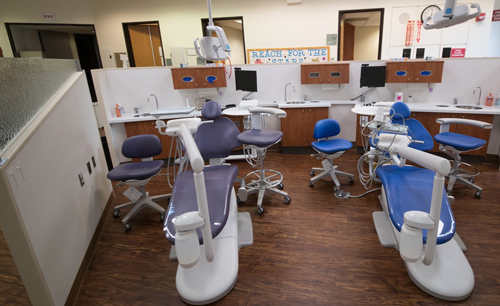Curriculum
Clinical Curriculum
The clinical curriculum is purposefully scaffolded with a focus on graduated autonomy from year one through year two spanning from hospital to community-based settings.
During the fall of first year, residents are primarily stationed at the pediatric dentistry clinic at Eastman Institute for Oral Health where they are fully supported by faculty.


Prior to commencing clinical care, first year residents complete an immersive “crash course” in pediatric dentistry which includes readings, lectures, case-based discussions, and hands-on simulations. First year residents are supported by faculty and senior residents as they then begin comprehensive and emergency care at Eastman. Clinical experiences focus on developing strong and diverse behavior guidance skills, comprehensive treatment planning taking into consideration growth, development, risk, and social factors, restorative and surgical treatment, disease management and prevention, and nitrous oxide anxiolysis. During the spring of first year, residents complete their pediatric medicine and anesthesia rotations at Golisano Children’s Hospital and Strong Memorial Hospital. First year residents also take call at URMC’s Level 1 Trauma Center in the emergency department and provide inpatient consultations at Golisano Children’s Hospital, while being supported by second year residents and faculty.

Second year residents are given opportunities to “spread their wings” as they branch out to experience pediatric dentistry clinical care with our community-based sites, operating rooms, cleft and craniofacial team, and hemophilia team. At the start of second year, residents complete an emergency medicine rotation. Throughout second year, residents also provide more advanced pediatric dental care such as oral conscious sedation and interceptive orthodontics in the Eastman Pediatric Dentistry Clinic. Second years begin to function more autonomously and also serve as mentors for the first-year residents, while being supported by pediatric dentistry faculty. Second years have one day per week dedicated to “development” which may include research and additional desired clinical and interdisciplinary experiences.